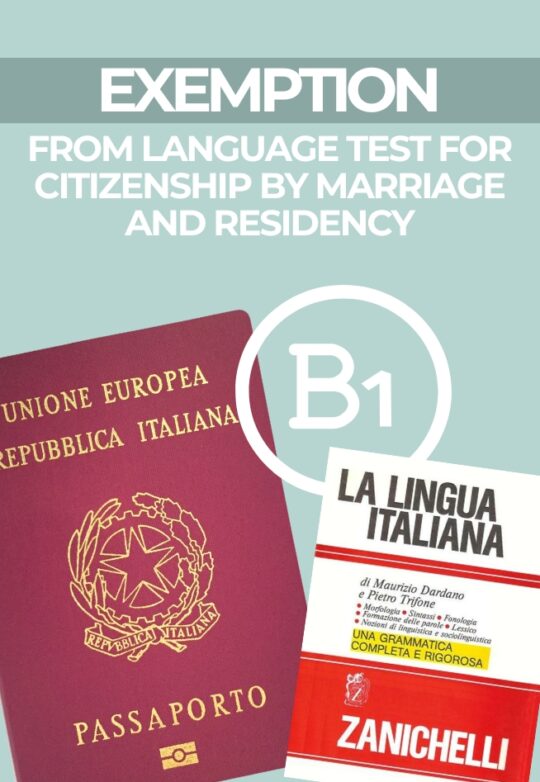A recent ruling by the Italian Constitutional Court changed the language requirement for Italian citizenship by marriage and residency applications. This article will outline what was stated in the ruling and review the eligibility requirements to apply for Italian citizenship through marriage or residence.
Italian Citizenship by Naturalization
Italian citizenship by marriage, or jure matrimonii, falls under the category of naturalization, regulated by Articles 5, 6, 7, and 8 of Law 91 of 1992. In order to apply, it’s necessary to have been married to an Italian citizen for 2 years (if residing in Italy), or married for 3 years (if residing abroad). These terms are reduced by half if the couple has children under the age of 18 or when children are legally adopted by the couple. Civil unions are also recognized in Italy, including same-sex marriages celebrated with a legally recognized civil union.
To apply for Italian citizenship by residency, non-EU citizens living in Italy on a valid residence permit are required a period of continuous legal residence in Italy of 10 years. EU citizens residing in Italy can apply for naturalization after a reduced residence requirement of 4 years. Also, if you have Italian ancestry to the second degree (parent or grandparent) but maybe don’t qualify for Italian citizenship by descent, you would be eligible to apply for naturalization after a 3-year period of legal residence. In addition, the current residence requirement is 5 years for those who are stateless, a refugee, or were over the age of 18 when adopted by an Italian national.
Current Language Requirement
Law December 1, 2018 n. 132 introduced a language requirement for applications for Italian citizenship by naturalization (marriage and residence). Applications presented after December 4, 2018 must include documentation certifying knowledge of the Italian language at the B1 level, which is considered an intermediate level according to the Common European Framework of Reference for Languages (CEFR). It can be demonstrated with a certificate issued by an educational institution approved by the Italian Ministry of Education (“MIUR”) or Ministry of Foreign Affairs (“MAECI”), or a degree earned by attending an Italian public educational institution recognized by the MIUR and MAECI.
Schools that offer the B1 certification approved for the citizenship application include:
- Università per Stranieri di Siena
- Università per Stranieri di Perugia
- Società Dante Alighieri
- Università Degli Studi Roma Tre
Additional schools offering certification may be specified by your local consulate, so it’s advised to check on the website for further instructions.
Italian Citizenship by Marriage Application
In addition to meeting the language requirement, another step in the preparation of a citizenship by marriage application will be to ensure that your Italian spouse is registered with AIRE (Registry of Italian Citizens Residing Abroad) (if you are living abroad). Registration is available through the Italian consulate that covers the jurisdiction of your current legal address. Additionally, if the couple is residing abroad, the marriage or civil union record (legalized with apostille) needs to be registered through the consulate, who will then register the record in Italy.
It is also required to submit background check certificates from the US states where you have resided since the age of 14, in addition to the federal FBI background check. It’s worth noting that the background checks have a 6-month validity, so be sure that the other documentation is already prepared before you request them.
Other records that will be required include a transcript of the marriage certificate registered in Italy and a certified copy of your foreign birth certificate. All foreign documents, including criminal background checks, must be legalized by means of an apostille and translated into Italian.
Italian Constitutional Court Ruling 25/2025
On March 7, 2025, the Italian Constitutional Court ruled that article 9.1 of Law no. 91 of February 5, 1992, which requires the knowledge of Italian at the intermediate level for any foreigner applying for citizenship through marriage or naturalization, is unconstitutional. The ruling states that the principle of equality is violated by not having provided exclusions for those affected by serious limitations in the ability to learn the language. It recognizes the “indirect discrimination” in the law against individuals who are unable to learn the language due to disability, illness, or advanced age. Furthermore, it adds that the law is creating an obstacle to the acquisition of citizenship for this specific category of vulnerable people. The court specified this mandate is contrary to the principle of ad impossibilia nemo tenetur, which is Latin for “no one should be held to do the impossible”. This ruling will now lead to a change in the legislation to include explicit exemptions for the Italian language requirement for citizenship by marriage and naturalization applications.
Should you have any questions or would like assistance in applying for Italian citizenship, please don’t hesitate to contact us for more information.

